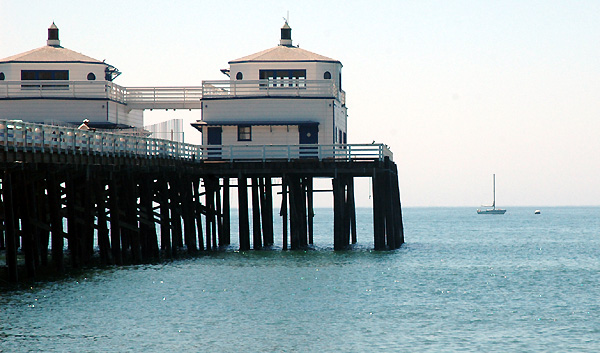Topic: Science
Heat Wave: Is This Weep-Silently-Apologize-To-Your-Children-And-Throw-Yourself-Out-A-Window Depressing?
300 scouts collapse in the heat waiting for President
James Bone, The Times (London, UK), July 29, 2005
Note this from James Wolcott:The quadrennial gathering of 32,000 boy scouts now under way at an army base in Virginia has been struck by a series of misfortunes that have cost four lives and made hundreds ill.
… On Wednesday, tens of thousands of scouts waited for Mr Bush for three hours in an open field in their dress uniforms.
Although the scouts were given exceptional permission to remove their uniform shirts, as long as they were wearing undershirts, many were overcome by the sun and high humidity and temperatures approaching 100F.
… About 300 people were treated for symptoms of excessive heat as soldiers ferried scouts to the medical post on the base.
The day ended with the announcement that Mr Bush was calling off his trip because of bad weather - just as he had done four years ago.
Note to Wolcott:It struck me that hundreds of Scouts collapsing in the heat awaiting a no-show president is a symbolic portent. I fully expect incidents of mass heatstroke to mount as we enter deeper and deeper into the baked Alaska of global warming. Years of ranting and heckling by Rush Limbaugh, Michael Savage, and other ignorati that global warming is a myth propagated by environmental wacko and economic no-growthers have lobotomized the lobes of millions of Americans and their greedy representatives, inducing a state of denial that no amount of news footage seems able to shatter.
Bush Comforts Thousands at Scout Jamboree
Deb Riechmann, Associated Press, Sunday, July 31, 2005
Third time is charm, and one suspect his political advisors knew this was looking real bad. So he showed up and said the appropriate things. The guy gets enough grief for seeming contemptuous of others and an arrogant, uncaring frat-boy prankster.Succeeding on his third try to visit them, President Bush comforted thousands of Boy Scouts on Sunday at a national jamboree marred by the electrocutions of four leaders and stifling heat that sickened 300.
"The men you lost were models of good citizenship," Bush told the estimated 50,000 Scouts, leaders and visitors attending the event near Bowling Green, Va., where boys yelled "Boy Scouts Rock!"
"As scout leaders, they devoted themselves to helping young men develop the character and skills they need to realize their dreams. These men will always be remembered for their leadership and kindness, and you scouts honor them by living up to the ideals of the Scouting they served."
The visited fixed all that? Hardly. I'm not sure you get points for showing up (late) - and for mouthing platitudes. But he did get around to it.
But what is Wolcott getting at with this dig at those who say global warming has not been proven? What is this about denial?
Wolcott links to the most recent news (July 29) of what he calls "The Great Arctic Sea Ice Melt-Off" - the source is this - scientists from our own government saying this is pretty ominous. (Will they keep their jobs?) This summer's melt is way out of line, and some of these science guys "are wondering if the melting of the sea ice has already gone beyond a critical threshold from which it can't recover."
Well, this has been the hottest June-July ever recorded in several eastern cities, according to data compiled by the Northeast Regional Climate Center at Cornell University. See this - and CNN here says it's the whole country.
Maybe a very cold winter will even things out, to a nice average.
Is something up? The Caribbean got warmer earlier this year, the kind of warm that provides the energy to turn minor storms into hurricanes, and this item quotes James McCarthy, a professor of biological oceanography at Harvard University, saying that as the world warms, we expect more and more intense tropical hurricanes and cyclones. Of course. That's logical.
One wonders - or some may wonder - if something is up. Of course it doesn't help that HBO in it current rotation is running the recent disaster movie The Day After Tomorrow (2004) five or six times a week. In the movie, curiously, global warming causes serious melting of the ice caps, and then all the fresh water in the ocean shifts the North Atlantic Current's salinity so it now runs cold, and then the climate patterns go all screwy - massive storms (Los Angeles is wiped out by tornados, one of which wipes out the Hollywood sign itself - and the Columbia Records building down the street!) - all followed by three new gigantic storms in the now much colder northern hemisphere, resulting in a sudden new ice age with most of the United States and all of Europe just sheets of ice, and the US government forced into exile in - get this! - Mexico. In the movie no one in the government would heed the warnings of the scientist-hero, especially the arrogant Vice President, who looked a lot like Dick Cheney, and sounded like him too. An oil man. Yeah, yeah.
Wolcott is on it. He quotes Ross Gelbspan who writes books on energy policy and global warming. Oil production will peak out in 2006 and then decline. And the climate is changing. And it may be too late now to do anything about any of it anyway. "Events are now set to run their course."
Wolcott:
Well, Wolcott is a tad upset that we're all in such denial, and that such denial led is to this situation where there really is no way to fix any of this. The oil supply is finite - and will peter out. And even if we stop burning fossil fuels and do all the green things, "it probably wouldn't make much difference even were it to occur."From Energy Bulletin:
"A few days ago Roger Pielke Jr. pointed to a paper (PDF) by Tim Dyson of the London School of Economics called 'On development, demography and climate change: The end of the world as we know it?' Pielke called it 'refreshingly clear thinking on climate change.' That's true, if by 'refreshingly clear' he means 'weep-silently-apologize-to-your-children-and-throw-yourself-out-a-window depressing.'"
If events run their course, what will that course be?
Here are the five main points made, quoted directly from the abstract:
"First, that since about 1800 economic development has been based on the burning of fossil fuels, and this will continue to apply for the foreseeable future.
"Second, due to momentum in economic, demographic, and climate processes, it is inevitable that there will be a major rise in the level of atmospheric CO2 during the twenty-first century.
"Third, available data on global temperatures ... suggest strongly that the coming warming of the Earth will be appreciably faster than anything that human populations have experienced in historical times. ... Furthermore, particularly in a system that is being forced, the chances of an abrupt change in climate happening must be rated as fair.
"Fourth ... the range of plausible unpleasant climate outcomes seems at least as great as the range of more manageable ones. The agricultural, political, economic, demographic, social and other consequences of future climate change are likely to be considerable - indeed, they could be almost inconceivable. In a world of perhaps nine billion people, adverse changes could well occur on several fronts simultaneously and to cumulative adverse effect.
"Finally, the paper argues that human experience of other difficult 'long wave' threats (e.g. HIV/AIDS) reveals a broadly analogous sequence of reactions. In short: (i) scientific understanding advances rapidly, but (ii) avoidance, denial, and reproach characterize the overall societal response, therefore, (iii) there is relatively little behavioral change, until (iv) evidence of damage becomes plain. Apropos carbon emissions and climate change, however, it is argued here that not only is major behavioral change unlikely in the foreseeable future, but it probably wouldn't make much difference even were it to occur."
If mankind is intent on committing mass suicide via stubborn denial, it could be argued that we will have earned our collective fate, even if that fate was reached largely without our consent. But the self-destruction of the planet also means the billions of animals and other living beings that inhabit this planet will also die, and their deaths will be truly innocent, the final indictment of mankind's failed stewardship of the earth.
We're screwed. Assess all the blame you want. What difference does that make?
Actually, if this is so - and the evidence points to it being so - then denial seems somehow appropriate. Fly in and say pleasant nothings to the sweating crowds of Boy Scouts. What's the difference?
Posted by Alan at 21:55 PDT
|
Post Comment |
Permalink
Updated: Sunday, 31 July 2005 22:07 PDT
home





